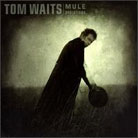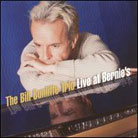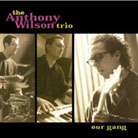![[SoundStage!]](../sslogo3.gif) The Vinyl Word The Vinyl WordBack Issue Article |
| February 2002 Found on Vinyl: Tom Waits, Anthony Wilson Trio and Bill Cunliffe Trio Get behind the mule I had a friend named Bob who hated olives. And for some reason, the fact that he hated olives bothered him. So one day, he sat down and forced himself to eat an entire jar. It was quite entertaining to watch, but beyond my amusement, there was a method to Bob’s madness. After he had finished, he was a touch green, but he no longer hated olives. Listening to Tom Waits is somewhat like eating olives. First off, there’s the slimy texture. If you get past that and manage to listen to an entire album, the thick, overpowering smell clings to you and makes you want to be sick. But stick with it and you’ll soon be a fan.
This is a brilliant album that disguises its genius under multiple layers of inbred, hillbilly grime. How’d you like to find yourself subconsciously singing lines like "Slap that hog/Gotta roll ‘im over twice/Baste him with a sweepin’ broom"? And what about "Come down off the cross/We can use the wood"? Is this brilliant or silly? Take your pick, but it gets under your skin, I tell you. In this world of cleanliness, godliness and corporate sterility, Tom Waits is essential. Mule Variations has been out for a while, and it may not be Waits’ best effort. So why, you might ask, am I including it here? Well, I’ve been listening to and enjoying this album since it came out on CD, but I only recently picked up the LP. This, my friends, is the way to listen to Tom Waits. After comparing both formats, it seems clear that Waits doesn’t like having his voice digitized. There’s more smoke, more cheap bourbon waiting to be dredged up from the bottom of the vinyl grooves. I can almost smell his bad breath through the added presence and richness served up on the LP. The vocals are more up front, more in your face, though, which isn’t so good if you don’t like his voice. But it’s not only the ruffian’s voice that benefits from the LP format. The entire mood of the album is better served on vinyl, all the way from the full-size photo on the cover and the legible liner notes, to the precise imaging and low-level detail that is nowhere near as profound on the CD. It’s right there on the album sleeve in black and white: "This LP recorded, mixed and mastered in analog." Images are clearer, the soundstage is deeper, surface noise is low, and there are none of the ticks and pops that are all too common on much of today's new vinyl. The fact that my copy is a bit warped adds to the crusty feel of the whole package and doesn’t bother me in the least. According to Rob at Applause Audio, my local high-end hangout, this LP is out of print, but both he and Music Direct still have copies, so get yours while you can. Sooner or later, you’ll like Tom Waits. Either that or you’ll rue the day that you took my advice. But you’ll never know unless you try. Direct to disc… 45rpm… Oh! My heart!
You wanna talk dynamics? Interested in finding out just how good your analogue front-end sounds? Think you’ve heard it all? When the lads from Groove Note decided that they wanted to pull out all of the stops and record a killer LP, they dispensed with the tape recorder and instead dragged a cutting lathe into the studio. While they were at it, they figured that they might as well cut the damn thing at 45rpm just to spite the people over at Analogue Productions, who’ve also just put out some D2D LPs. Basically, what we have here is the best-sounding LP that I have ever heard. This record beats, hands down, all of the MoFi, Sheffield Labs, Three Blind Mice and Water Lily Acoustics discs that I own or have listened to. The upright bass sounds huge, not only in extension and weight, but also in sheer physical size. The cymbals have a real and dynamic shimmer with decay that goes on forever. And the piano? Well, there’s a piano in my room, right between the speakers. I didn’t think it would fit, but the Groove Note guys managed to jam it in there. Don’t ask me how. Yeah, I know, you’ve heard this tune before. "This is the best-sounding [whatever] that I’ve ever heard" hyperbole gets boring after a while, right? How can sound quality keep improving with every issue of every magazine? Well, this is the real deal. The direct-to-disc process, by which an LP master is cut, in one take, right there in the recording studio (as opposed to recording onto tape and cutting the master later), truly raises the sound-quality bar another notch. And by cutting at 45rpm, more information is packed on to an LP side. The downside of the faster speed is, unfortunately, a shorter playing time, but so what? Call me when they start recording at 360rpm with a three minute side. It’ll sound fantastic, but you’ll need to increase the anti-skating! How’s the music? Well, the jazz piano trio format is as old as the hills. So, if you want to make a noteworthy piano-bass-drums recording, you’ve got to bring something new to the table. That’s not so easy when you consider the geniuses who’ve gone before, such as Oscar Peterson and Bill Evans. Face it: If you paint haystacks, be prepared for comparisons to Monet. That’s why I consider Live At Bernie’s a brave recording. These guys give it their all. And while I can’t say that they’ve come up with a groundbreaking collection, it’s competently played. Unfortunately, competency’s not quite enough to make me want to listen to this album repeatedly. They’ve got the licks down, but there’s not much feeling present. Take "Satin Doll," for instance. They’ve managed to avoid sounding schmaltzy (which isn’t easy with this tune), but there’s a lack of direction and drive, with the tune existing only to provide a home for solos that don’t connect with the root of the melody. The cohesiveness that makes the best piano trios so riveting is missing in action from Live at Bernie’s. To tell the truth, I get the feeling that a live, direct-to-disc recording may not be the best format for the Bill Cunliffe Trio. They just don’t sound relaxed. They’re playing just fine, but it’s not compelling, and I’ve gotten much the same reaction from other people I’ve played this album for. Please keep in mind, though, that the technique of this group’s playing is pretty damn good, and that your response to the music may be different from mine. Once you factor in the astonishing sound quality, I figure it’s worth taking a chance on this album. Work that organ
The B3’s a weird instrument. It’s got that primitive, it-shouldn’t-really-work-at-all feel that’s shared by the recorder, the French horn and the Fender Telecaster. But it sure does have its fans. I like the sound, as it lends itself to a laid-back groove like that made popular -- or brought back from obscurity, take your pick -- by Medeski, Martin and Wood. So yeah, this record’s got a funky base to it, but it’s quite relaxing, with a slow pace that verges on sedate. In fact, I found that I enjoyed it most while I was reading. "Wait a minute", I hear you saying. "I don’t want reading music! I want to be transported to heaven via singing angels! I want rapture!" Unfortunately this album might not give it to you. Let’s face it, though, not all music will raise goosebumps, and that’s just fine. Some music is for dancing, some is for listening, and some is just great for reading. I place Talk Talk and Brian Eno in the last category. Not much happens that’s musically thrilling with either of these bands, and I sit back and relax into their albums, while the music provides an ambient backdrop. And so it is with the Anthony Wilson Trio. I found that if I paid too much attention to the music, audiophile-style, I became antsy and annoyed while I waited for something exciting to happen. But if I chilled out and did other things, I began to get into the groove and enjoy the calm, open feel of the album. The interplay between the drums and the B3 certainly has the requisite cool, which contributes to the relaxed, easy-going tone. These guys have MM&W as a basis, but the music is less intense, with the cool, old-school electric guitar tone nicely complementing the modern, loping drum rhythms. This album is definitely one musical notch above the typical audiophile hum-drum monotony. There’s plenty of musical space around each instrument -- perhaps too much, as each musician can sound somewhat detached from the rest. If you really concentrate on the music, you may find it a touch emotionless, which is perhaps why my direct attention wasn’t rewarded. But that’s missing the intent, as far as I’m concerned. When you have a good stereo, the temptation’s always there to expect the world from any music you slap on the ‘table. If you can avoid that trap, AWT can provide you with some enjoyable tunes. As with the Bill Cunliffe Trio, you’re paying for Groove Note’s stellar production, packaging and pressing standards. While not cut direct to disc, Our Gang is beautifully recorded -- up there with the best from any audiophile label -- and is pressed on what may be the glossiest, cleanest-sounding vinyl that I’ve ever encountered. It’s almost good enough to eat. And to top it off, it comes with a delicious 45rpm EP that contains two tracks that weren’t on the CD. I realize that I’ve been rather hard on both the Bill Cunliffe and Anthony Wilson Trios, and perhaps that’s not fair. Today we have immediate access to the best the world has to offer, be it music, art or literature. And that makes it easy for me to compare Bill Cunliffe to Oscar Peterson, and Anthony Wilson to Medeski, Martin and Wood. But these two Groove Note artists have something musically valid to say, and maybe I should congratulate them on working in conjunction with their label to put out two astonishingly good-sounding albums of well-played, enjoyable jazz. ...Jason Thorpe
|
|
![[SoundStage!]](../sslogo3.gif) All Contents All ContentsCopyright © 2002 SoundStage! All Rights Reserved |
 If you’re
unfamiliar with Waits’ music, Mule Variations [Anti/Epitaph 86547-1] is a
great place to start your descent. Mule Variations could be considered a
greatest-hits album consisting of all-new material. As such, this album contains songs
that run the stylistic gamut from Waits’ early, bum-in-a-bar slumming period right
through the dissonant, clanging noise typified by Swordfishtrombones. Fortunately,
even the clashing numbers, such as "Filipino Box Spring Hog" have at their root
a listenable tune (although "listenable" really is a subjective term when
applied to Waits). As a bonus, there are even a few ballads that your significant other
may just be able to tolerate.
If you’re
unfamiliar with Waits’ music, Mule Variations [Anti/Epitaph 86547-1] is a
great place to start your descent. Mule Variations could be considered a
greatest-hits album consisting of all-new material. As such, this album contains songs
that run the stylistic gamut from Waits’ early, bum-in-a-bar slumming period right
through the dissonant, clanging noise typified by Swordfishtrombones. Fortunately,
even the clashing numbers, such as "Filipino Box Spring Hog" have at their root
a listenable tune (although "listenable" really is a subjective term when
applied to Waits). As a bonus, there are even a few ballads that your significant other
may just be able to tolerate. The excitement! Live At
Bernie’s by The Bill Cunliffe Trio [Groove Note GRV1009-1DD] is a new LP from the
people at Groove Note.
The excitement! Live At
Bernie’s by The Bill Cunliffe Trio [Groove Note GRV1009-1DD] is a new LP from the
people at Groove Note. Another LP from
Groove Note is Our Gang by the Anthony Wilson Trio [Groove Note GRV1008-1]. Like
the Bill Cunliffe Trio, Wilson's is a fairly minimalist group, except that it features a
Hammond B3 organ and electric guitar front and center.
Another LP from
Groove Note is Our Gang by the Anthony Wilson Trio [Groove Note GRV1008-1]. Like
the Bill Cunliffe Trio, Wilson's is a fairly minimalist group, except that it features a
Hammond B3 organ and electric guitar front and center.